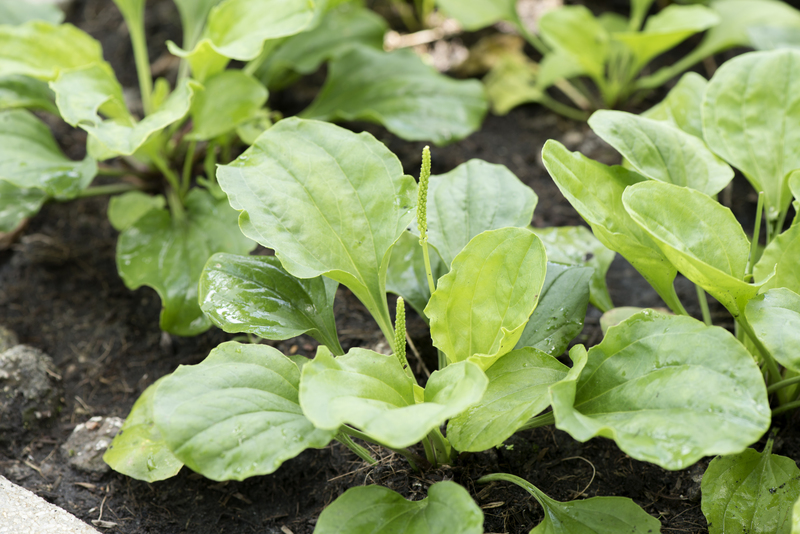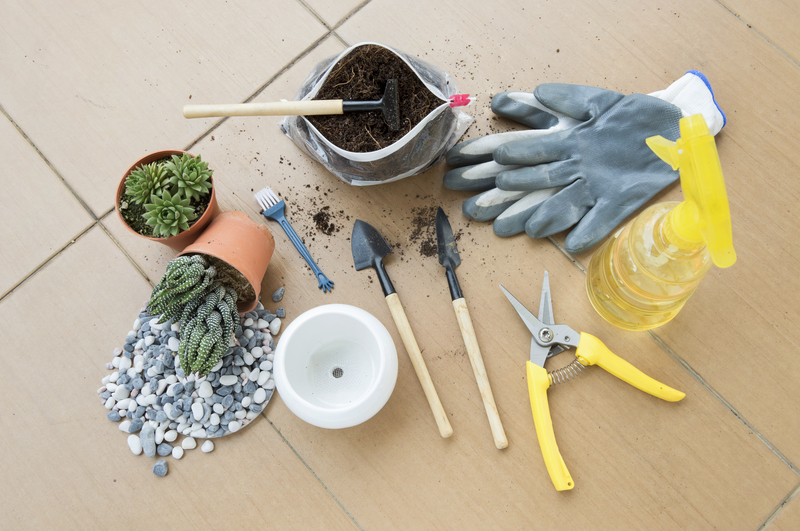Become a Plant Whisperer: 9 Essential Gardening Tips for Beginners
Posted on 12/09/2025
Become a Plant Whisperer: 9 Essential Gardening Tips for Beginners
Do you dream of lush garden beds, vibrant flowers, and healthy vegetables but feel lost when it comes to gardening? Becoming a plant whisperer isn't reserved for the naturally green-thumbed--it's a skill anyone can develop with the right knowledge and practice. Whether you're starting with a sunny windowsill, a balcony, or a backyard, following essential gardening tips will set you on the path to gardening success.
In this comprehensive, SEO-optimized guide, we'll share nine crucial gardening tips for beginners. Learn how to nurture your plants, maintain fertile soil, battle pests organically, and more to transform your outdoor or indoor space into a flourishing oasis.
Why Learn the Art of Plant Care?
Understanding the fundamentals of gardening is more than just a hobby; it's a doorway to wellness, sustainability, and creativity. Plants purify the air, boost mental health, and provide nutritious food. By developing your gardening skills, you become a true plant whisperer--able to sense your plants' needs and respond intuitively.

9 Essential Gardening Tips for Beginners
Without further ado, let's delve into these essential gardening tips for beginners that will make your garden thrive:
1. Choose the Right Plants for Your Location
- Assess Sunlight: Observe your chosen location throughout the day. Most plants require at least 6 hours of sunlight, but some thrive in partial or full shade.
- Check Climate Suitability: Always select plant varieties suited to your USDA Hardiness Zone or regional weather patterns. Native and adaptive plants are more likely to succeed.
Pro Tip: Start with hardy, low-maintenance varieties such as zinnias, marigolds, mint, or lettuce if you're new to gardening.
2. Understand Your Soil
- Before planting, test your soil for pH, texture, and nutrients. You can purchase a simple at-home soil test kit or contact local gardening centers for help.
- Healthy soil is the foundation for plant success. Enrich with organic compost, manure, or leaf mold to add nutrients.
"Feed the soil, not just the plants." This age-old gardener's mantra highlights how crucial it is to keep your soil teeming with life.
3. Master the Art of Watering
- Water consistently, but avoid overwatering. Most plant roots prefer moist, not soggy, soil.
- Water early in the day to reduce evaporation and prevent fungal diseases that thrive on wet leaves overnight.
- Deeply water less often rather than shallowly every day--this encourages roots to grow deeper and stronger.
Become a garden whisperer by feeling the soil each morning; if it's dry two inches down, it's time to water.
4. Mulch for Moisture and Weed Control
- Apply a 2-3 inch layer of organic mulch--such as shredded bark, straw, or dried leaves--around your plants.
- Mulch retains moisture, keeps roots cool, and significantly reduces weeds, saving time and effort.
*Bonus Whisperer Tip*: Avoid piling mulch against plant stems--this can cause rot and attract pests.
5. Learn the Science of Plant Feeding
- Plants need a balance of nitrogen, phosphorus, and potassium (NPK), plus trace minerals for healthy growth.
- Use slow-release fertilizers or organic options to minimize nutrient run-off and support soil life.
- Feed most garden plants in early spring and as directed throughout the growing season.
Tip for aspiring plant whisperers: Always follow label instructions and never over-fertilize, as this can damage delicate plant roots.
6. Start Small and Expand Gradually
- Resist the urge to plant a massive garden right away. Beginning with a few containers or small raised beds makes maintenance easier and helps you learn what works in your specific setting.
- As your confidence grows, gradually introduce new varieties and more garden space.
Quality beats quantity when you're mastering the secrets of plant care!
7. Recognize and Prevent Pests Naturally
- Inspect your plants regularly for insects, discoloration, or holes in leaves.
- Encourage beneficial insects like ladybugs, lacewings, and bees to help control harmful pests.
- Use natural pest control solutions: insecticidal soap, neem oil, or homemade garlic sprays are effective and eco-friendly.
Pest tip: A healthy, diverse garden is naturally less vulnerable to infestations. Rotate crops and mix plant species to keep pests at bay.
8. Practice Pruning and Deadheading
- Prune plants to remove dead or diseased stems, improve air circulation, and encourage bushier growth.
- Deadheading (removing spent flowers) can promote longer blooming and keep your plants tidy and healthy.
- Always use clean, sharp tools to prevent spreading diseases between plants.
Confidence grows with each snip--pruning is a fundamental skill of every expert gardener!
9. Observe, Learn, and Enjoy the Process
- Document your gardening journey in a notebook or app. Note what works, plant varieties, weather patterns, and growth progress.
- Celebrate small victories like your first flower bud or ripe tomato--it's all about the journey, not just the outcome!
- Connect with local gardening clubs, forums, or neighbors. Shared experiences boost learning and enjoyment.
The best plant whisperers are curious, observant, and patient. There is no substitute for hands-on experience!
Common Mistakes New Gardeners Make (And How to Avoid Them)
As a beginner, it's natural to make a few mistakes. Here are the most common ones--and how you can sidestep them:
- Overwatering: More plants die from too much water than too little. Always check soil moisture before watering.
- Planting Too Deep or Too Shallow: Follow packet directions and remember seed size often determines planting depth.
- Ignoring Soil Health: Feed your soil organic matter regularly and avoid compacting soil by walking on garden beds.
- Neglecting to Mulch: Skipping mulch invites weeds and stress due to drying out.
- Going Too Big, Too Soon: Small, well-cared-for gardens are less overwhelming and more productive than sprawling ones neglected for time.
How to Develop Your Plant Whisperer Instincts
Becoming a true plant whisperer means cultivating observation skills and empathy for your plants' needs:
- Listen and look: Pay attention to wilting, leaf color changes, or slower growth--these are signals your plant is sending you.
- Respond thoughtfully: Adjust watering, relocate plants for better sunlight, or amend soil as needed.
- Never stop learning: Every new season brings fresh challenges, from unusual pests to unexpected weather.
"The best fertilizer is the gardener's shadow." Spend time with your plants, observe their progress, and you'll grow together!
Helpful Resources for New Gardeners
- Local Cooperative Extension Offices: These provide region-specific growing advice, soil testing, and plant disease identification.
- Gardening Books & Magazines: Start with classics like The Vegetable Gardener's Bible or The Flower Gardener's Bible for in-depth guidance.
- Online Gardening Communities: Websites like Garden.org, Reddit's r/gardening, and Gardeners' World offer communities and troubleshooting help for every skill level.
- Mobile Apps: Try apps like PlantSnap or PictureThis for identifying plants and keeping track of your gardening journey.

Final Thoughts: Transform Your Space and Your Life
Everyone can learn to become a plant whisperer. With the right gardening skills and a little practice, your garden will reward you with fresh food, fragrant blooms, and a sense of accomplishment. Remember these essential gardening tips for beginners, stay observant, and embrace the process. Your journey to gardening mastery starts today--happy growing!
Frequently Asked Questions (FAQs) About Gardening for Beginners
- What are the easiest vegetables and flowers for beginners?
Some of the most reliable plants for beginners include radishes, lettuce, marigolds, sunflowers, and nasturtiums. - How often should I water my plants?
This varies based on plant species, soil, and weather. Generally, water when the top inch or two of soil feels dry. Early mornings are preferred! - How do I keep pests away naturally?
Introduce beneficial insects, maintain plant health, and use natural treatments like neem oil or garlic spray as needed. - What should I do if my plants start looking sick?
First, check for signs of pests or disease. Adjust watering or sunlight, and amend the soil if required. Research specific symptoms or ask a local expert for guidance.
With patience, observation, and the right knowledge, you'll be *speaking the language of plants* in no time--ready to transform any space into a living haven!
Latest Posts
Affordable Ways to Achieve Low Maintenance Garden Bliss
Innovative Ideas for a Child-Focused Garden Design
Unlocking the Mysteries of Successful Orchid Care
Digging Deeper: Gardening's Role in Climate Action
Become a Plant Whisperer: 9 Essential Gardening Tips for Beginners

